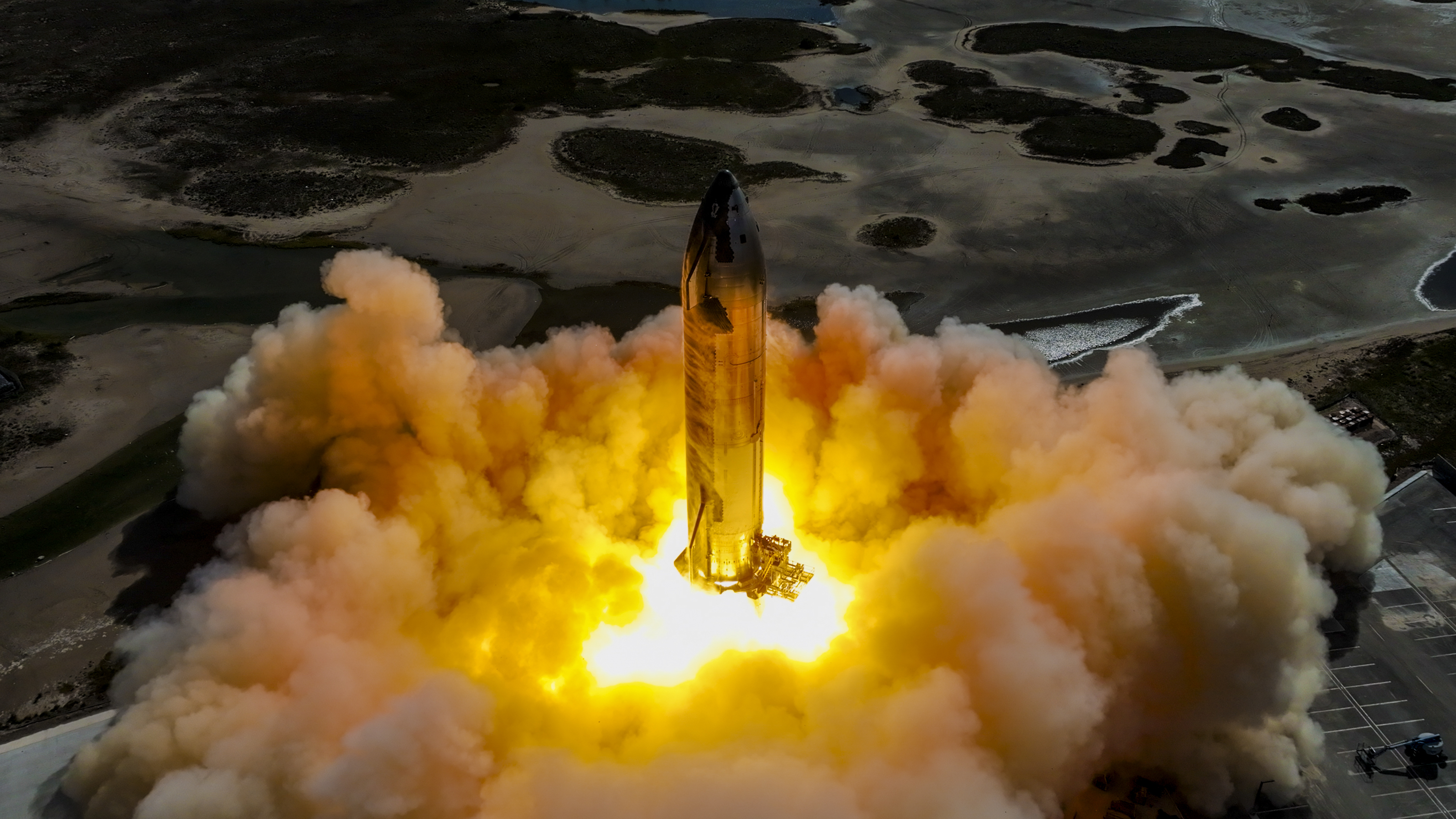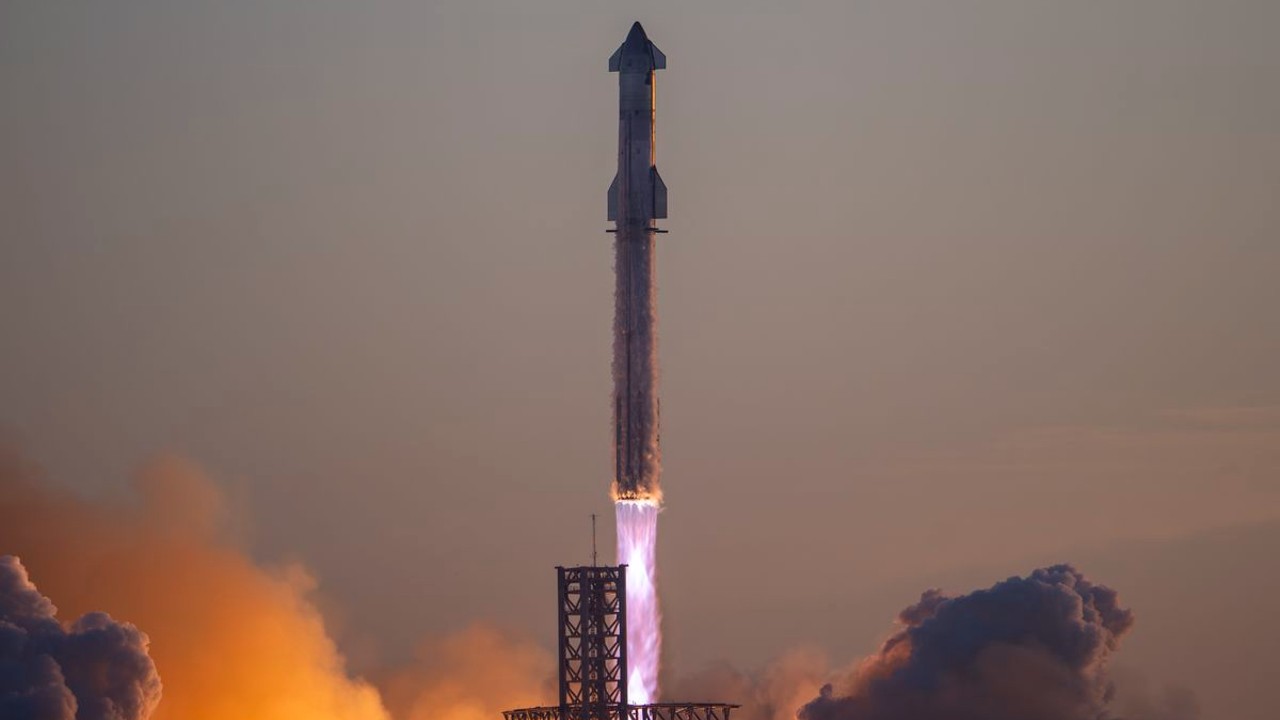SpaceX targeting February for Starship's 3rd flight test
'It's looking like three will occur in February of this year.'

We could see Starship return to flight as soon as next month.
SpaceX's massive, reusable Starship rocket made two test flights in 2023, the first in April and a second in November, and company representatives now say the third such mission could come as soon as February 2024.
During a media teleconference on Tuesday (Jan. 9) that was held to discuss updates to NASA's Artemis moon program, SpaceX Vice President of Customer Operations and Integration Jessica Jensen said the company is already seeking approval for Starship's third flight. "From a hardware readiness perspective, we are targeting to be ready in January. And then, from an FAA licensing perspective, we're getting a license for flight three," Jensen said, referring to the U.S. Federal Aviation Administration.
Jensen added that SpaceX is currently finishing up making corrective actions requested after Starship's second flight test, but that the company expects FAA approval for the third flight test to come in February. "We're expecting that license to come in February. So, it's looking like like three will occur in February of this year."
Related: SpaceX fires up giant Starship rocket ahead of 3rd test flight (video)
Another topic that was discussed in detail during Tuesday's teleconference was the off-Earth propellant transfer that SpaceX and NASA are planning as part of the Artemis 3 mission a few years from now. In 2021, NASA selected Starship as its crewed lander for Artemis 3 — the vehicle that will carry two astronauts to the surface of the moon and then back up to lunar orbit once their stay is complete.
But because rockets and spacecraft burn through most of their fuel while escaping Earth's deep gravity well, a massive vehicle like Starship would need to be re-fueled in orbit before continuing on to the moon. One lingering question has centered on how many of these refueling flights it would take to top off Starship in orbit.
Get the Space.com Newsletter
Breaking space news, the latest updates on rocket launches, skywatching events and more!
During Tuesday's teleconference, that question was brought up, and NASA Administrator Bill Nelson even stepped in to ensure that the question was answered when Jensen's initial response didn't directly state a specific number.
Jensen replied that it will require "roughly 10ish" flights to fuel up the Artemis 3 Starship in space, although that number could change based on how tests of the propellant transfer capability pan out. Jensen pointed out that Starship's upcoming third test flight will "not be the mission that does the on-orbit ship-to-ship propellant transfer" that will be necessary for Artemis 3.
"It sounds complex and scary, and it seems like this kind of big nebulous thing, but when you really break it down into the various pieces, we've actually achieved almost all of the complex parts already on our operational programs now, and it's just gonna be piecing them together for Starship," Jensen added.

NASA's Amit Kshatriya, deputy associate administrator for the agency's Moon to Mars Program, added that one reason so many different numbers of propellant transfer flights have been estimated previously is that the agency and SpaceX have multiple models and analyses to try and estimate what refueling Starship will entail.
"But the rubber's gonna meet the road when we actually try and do this in orbit," Kshatriya said. "SpaceX has been extremely transparent with us, and we've been sharing a lot of data with them about our own challenges in terms of cryogenic refueling."
Kshatriya added that, in addition to propellant transfer tests, the agency wants to conduct an uncrewed landing test on the moon with Starship prior to Artemis 3.
As announced during Tuesday's teleconference, NASA is currently aiming for September 2025 for the crewed Artemis 2 mission, which will send a crew of four around the moon and back. The history-making crew will include three NASA astronauts — commander Reid Wiseman, pilot Victor Glover (who will be the first person of color to leave low Earth orbit, or LEO) and mission specialist Christina Koch (the first woman) — as well as Canadian Space Agency astronaut Jeremy Hansen (who will become the first non-American to leave LEO).
Artemis 3 will then follow in September 2026, Nelson said. Given the timelines with Starship flight tests and propellant transfer tests, that target sounds increasingly ambitious.
Join our Space Forums to keep talking space on the latest missions, night sky and more! And if you have a news tip, correction or comment, let us know at: community@space.com.

Brett is curious about emerging aerospace technologies, alternative launch concepts, military space developments and uncrewed aircraft systems. Brett's work has appeared on Scientific American, The War Zone, Popular Science, the History Channel, Science Discovery and more. Brett has English degrees from Clemson University and the University of North Carolina at Charlotte. In his free time, Brett enjoys skywatching throughout the dark skies of the Appalachian mountains.









